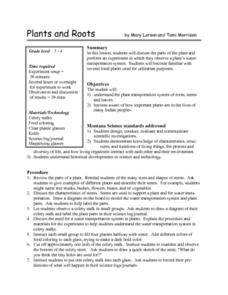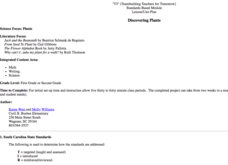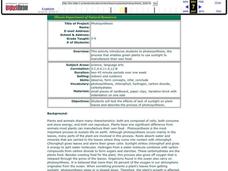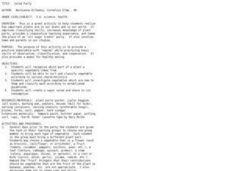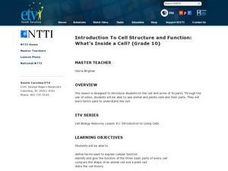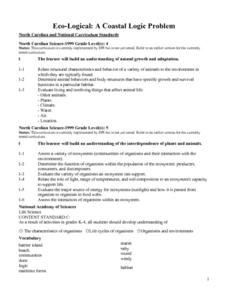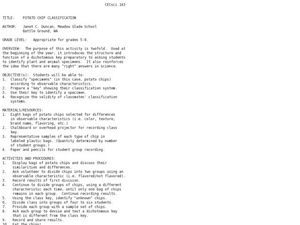Curated OER
This Can't be a Plant
Students grow mold. In this science experiment lesson plan, students grow mold on different pieces of bread by adjusting the moisture, temperature, and light. They record the results to see which grows the most mold.
Curated OER
Strawberry Girl: Lesson 3 - Trains, Sails, and Trails
Young scholars read two chapters of Strawberry Girl by Lois Lenski and complete activities about Florida's transportation history. In this literacy and economics lesson, students read two chapters of the book, talk about their journal...
Curated OER
Science Vocabulary: Grade 3
Third graders will be able to tell you all the parts of the life cycle after viewing this presentation. This series of slides contains single words related to the life cycle and simple definitions of each. Note: Adding vivid images would...
Curated OER
Phragmites australis: Invasive Plant Species
Students research and investigate invasive species, with specific focus on the exotic plant Phargmites australis and its impact on Piermont Marsh near the community of Piermont, New York.
Curated OER
Plants and Roots
Students discuss the parts of the plant and
perform an experiment in which they observe a plant's water
transportation system. They become familiar with
several local plants used for utilitarian purposes.
University of Southern California
Discovering Plants
Students construct a small greenhouse and plant lima beans. They read books about plants, tend the lima bean seedlings, observe and record plant growth, taste a variety of plants and maintain plant journals.
Curated OER
Photosynthesis
Students are introduced to the process of photosynthesis. In groups, they test the effects of the lack of sunlight on plant leaves and compare the results with their hypothesis. They note the characteristics that plants and animals share...
Curated OER
Tree Identification - Up Close And Personal
Fourth graders go to an outdoor area and are assigned a specific native plant to observe. They read about and answer questions about their tree. They draw the tree. Finally, 4th graders teach the rest of the class about their tree.
Curated OER
The Origin of Life
In this origin of life worksheet, students write answers to five questions. They describe characteristics of the first life forms and how scientists believe oxygen accumulated in the Earth's atmosphere.
Curated OER
Simple Genetics Practice Problems
Geneticists of the future identify heterozygous and homozygous genotypes, describe phenotypes, and use Punnett squares to solve problems and determine characteristics of offspring. A total of 15 questions make this a compact quiz or...
Curated OER
Butterfly 2: A Butterfly's Home
Students determine which environmental characteristics make up a favorable butterfly habitat.
Nuffield Foundation
Biodiversity in Your Backyard!
Take your enthusiastic ecologists outdoors to explore the biodiversity right in their own schoolyard! In preparing for this activity, it may be worthwhile to research websites with local flora to help in the plant identification portion.
Curated OER
Invent an Insect
Explore biology by researching adaptation. First, learners research and define a list of insect vocabulary terms and discuss the benefits of each insect characteristic. They then utilize a worksheet to create their own insect and share...
Curated OER
Seeds and Trees Lesson Plan
Students investigate various tree leaves and use a dichotomous key to classify the leaves. For this leaf classification lesson, students study various types of leaves and their Genus. Students record observations for each Genus.
Curated OER
Vegetable Party
Students classify vegetables and eat them as a salad. In this multi-disciplinary science and health lesson, students bring various vegetables to school and classify them in several different ways. Then with parent helpers, the students...
Curated OER
Introduction To Cell Structure and Function: What's Inside a Cell?
Tenth graders are introduced to the cell and some of its parts. Through the use of video, 10th graders see animal and plants cells and their parts. They learn terms used to explain the cell.
Curated OER
Marine Animal and Plant Adaptations
Learners examine nature by creating their own animals. In this animal adaptation lesson, students define scientific vocabulary terms dealing with adaptation such as sea stars, sea cucumbers and exoskeleton. Learners utilize their...
National Park Service
Who Grows There?
More than 127 non-native species live in Glacier National Park in Montana and their infestations are growing! Pupils read about and gather samples of exotic plants. Participants create a master book of pressed plants and complete a...
Cornell University
What is IPM?
Discover what a pest is and how to identify one with a lesson that looks closely at our outside world and taxonomy. Scholars investigate insects and plants to practice their identification skills, take a survey, and explore the...
Virginia Department of Education
Cell Parts
What do a bird, an egg, a rabbit, and a toad all have in common? This fun-filled resource explains the similarities and differences between cells and how all cells are similar, yet all are different. Learners begin by depicting a...
Curated OER
Plants
Second graders examine the characteristics of plants. As a class, they brainstorm a list of items plants need in order to survive. In groups, they complete various experiments in which they discover the functions of the parts of the plant.
Curated OER
Eco-Logical: A Coastal Logic Problem
Fourth graders study the characteristics of five coastal communities. They use logic cards and matching activities to identify the proper community for plant and animal species.
Curated OER
Relationships and Biodiversity Lab
In this relationships and biodiversity worksheet, learners investigate the relationships between 4 plants sample using 7 different tests. These include looking at structural characteristics of the plants, seeds and stems, using paper...
Curated OER
Potato chip Classification
Students create a dichotomous key using potato chips. In this classification lesson, students sort potato chips into groups based on observable characteristics. They record their results to create a dichotomous key in preparation for...






